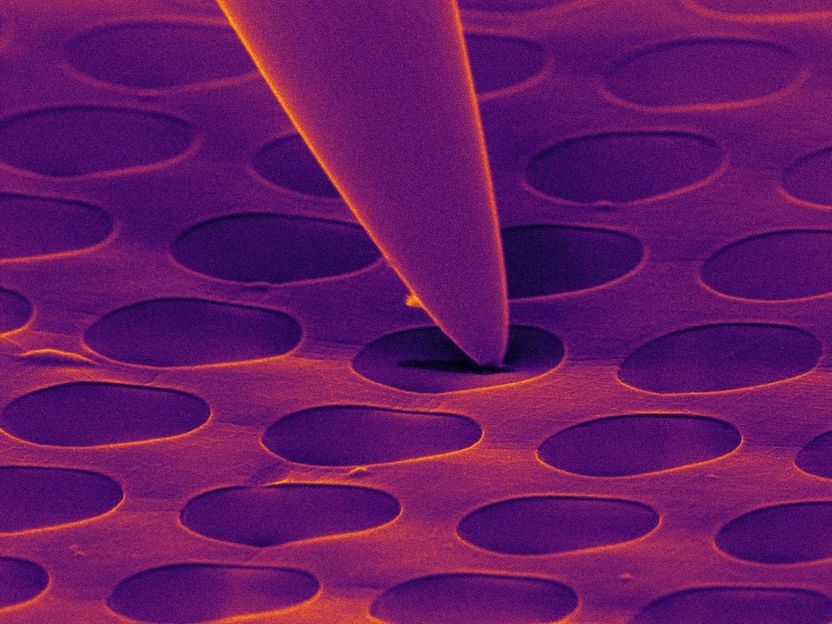Belgian Chemist Receives 2022 Heinrich Emanuel Merck Award for Analytical Science
The groundbreaking aspect of her work centers on making circular dichroism ion spectroscopy feasible for large biomolecule ions
Merck, a leading science and technology company, today presented Dr. Valérie Gabelica (44), Inserm, and Director of IECB, Pessac, France, with the 2022 Heinrich Emanuel Merck Award for Analytical Science. The award ceremony took place during the analytical conference EuroFAST2022, Nijmegen, the Netherlands, where the prize winner held a lecture entitled “Advancing mass spectrometry to study nucleic acid structures and interactions”.

Valérie Gabelica Receives 2022 Heinrich Emanuel Merck Award for Analytical Science
Merck KGaA
“It is a great honor and I am particularly grateful to Merck for shining the spotlight on analytical chemistry. Although sometimes considered ancillary tools, new analytical developments are indeed the backbone of any scientific endeavor,” Gabelica said after receiving the award.
Gabelica has developed analytical methods based on mass spectrometry to study nucleic acid structures and their interactions with neighboring molecules. The groundbreaking aspect of Gabelica’s work centers on making circular dichroism ion spectroscopy feasible for large biomolecule ions. With mass spectrometry so far typically unable to detect chirality, her work opens new doors to measuring chirality directly with the mass spectrometer. Gabelica’s research to measure circular dichroism directly on biomolecular ions expands the capabilities of mass spectrometry for structural analysis. It could enable a wide range of applications, taking advantage of the mass separation and circularly polarized light to characterize other chiral molecules. She has achieved international acclaim with an article published in the trade magazine “Science”.
This year’s winner of the Heinrich Emanuel Merck Award for Analytical Science obtained a PhD in Chemical Sciences in 2002 at the University of Liège, Belgium. After a postdoc position as a Humboldt fellow at Goethe University in Frankfurt, Germany, Gabelica rejoined the Mass Spectrometry Laboratory at the University of Liège as a research associate in 2005. She then moved to the Institut Européen de Chimie et Biologie (IECB, Pessac, France) in 2013, where she is the current director, and became a research director at Inserm (Institut national de la santé et de la recherche médicale – French National Institute of Health and Medical Research).
“With her groundbreaking investigations revealing molecular interactions, Valérie Gabelica joins a prominent group of innovative Heinrich Emanuel Merck Award winners,” said Ulrich Betz, Vice President Innovation at Merck. “By directly assessing the chirality of any molecule already during mass spectrometry, the versatility of this technology has been greatly enhanced with potential further use in life science and drug discovery.”
The Heinrich Emanuel Merck Award for Analytical Science, worth € 15,000, has been recognizing scientists focusing on new methods in chemical analysis and the development thereof since 1988. The resulting applications are aimed at improving the quality of human life, for example in fields such as life, material and environmental sciences.
Apart from the award presented today, Merck recognizes science and scientists with many other awards. The latest addition to this is the Future Insight Prize, which was announced for the first time in July 2018 and will be awarded again in July of this year to researchers for their work on helping to combat climate change. Further research grants and awards from Merck include, among others, the Emanuel Merck Lectureship, the Innovation Cup. and the Alfred A Bader Award for student innovation.
Other news from the department people

Get the chemical industry in your inbox
By submitting this form you agree that LUMITOS AG will send you the newsletter(s) selected above by email. Your data will not be passed on to third parties. Your data will be stored and processed in accordance with our data protection regulations. LUMITOS may contact you by email for the purpose of advertising or market and opinion surveys. You can revoke your consent at any time without giving reasons to LUMITOS AG, Ernst-Augustin-Str. 2, 12489 Berlin, Germany or by e-mail at revoke@lumitos.com with effect for the future. In addition, each email contains a link to unsubscribe from the corresponding newsletter.
Most read news
More news from our other portals
See the theme worlds for related content
Topic World Spectroscopy
Investigation with spectroscopy gives us unique insights into the composition and structure of materials. From UV-Vis spectroscopy to infrared and Raman spectroscopy to fluorescence and atomic absorption spectroscopy, spectroscopy offers us a wide range of analytical techniques to precisely characterize substances. Immerse yourself in the fascinating world of spectroscopy!

Topic World Spectroscopy
Investigation with spectroscopy gives us unique insights into the composition and structure of materials. From UV-Vis spectroscopy to infrared and Raman spectroscopy to fluorescence and atomic absorption spectroscopy, spectroscopy offers us a wide range of analytical techniques to precisely characterize substances. Immerse yourself in the fascinating world of spectroscopy!
Topic World Mass Spectrometry
Mass spectrometry enables us to detect and identify molecules and reveal their structure. Whether in chemistry, biochemistry or forensics - mass spectrometry opens up unexpected insights into the composition of our world. Immerse yourself in the fascinating world of mass spectrometry!

Topic World Mass Spectrometry
Mass spectrometry enables us to detect and identify molecules and reveal their structure. Whether in chemistry, biochemistry or forensics - mass spectrometry opens up unexpected insights into the composition of our world. Immerse yourself in the fascinating world of mass spectrometry!






























































